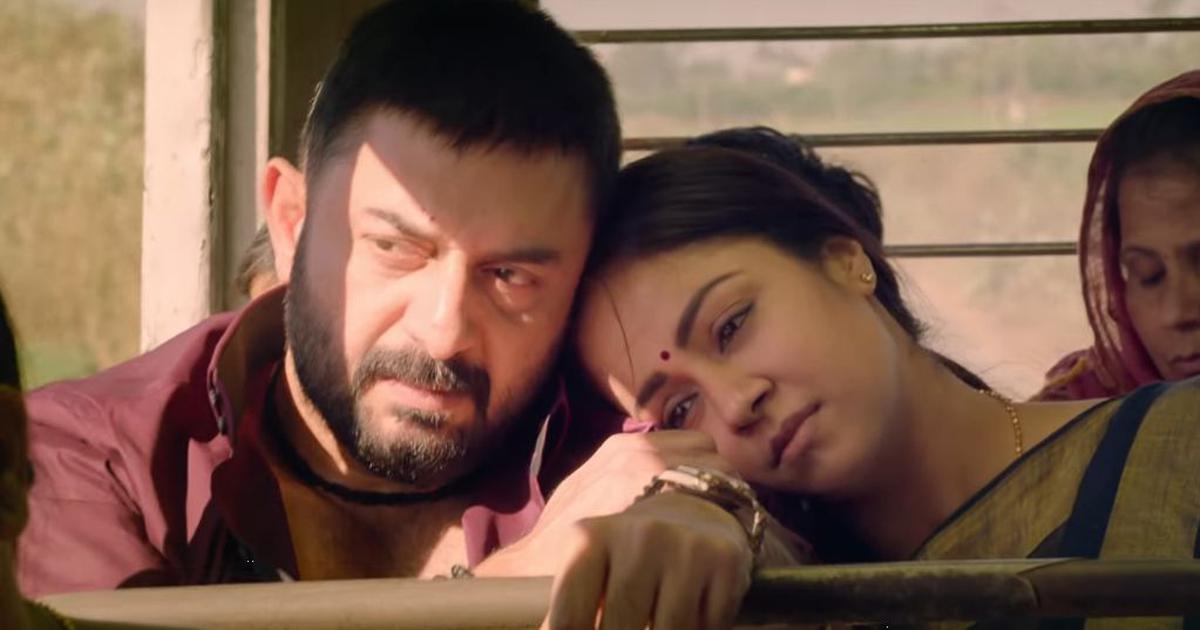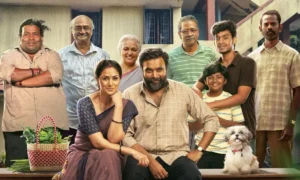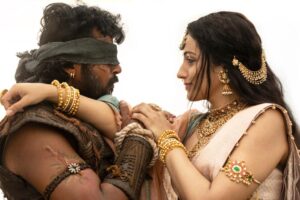
“People who live in glass houses shouldn’t throw stones”, goes the popular saying. In a badass antithesis, the powerful gangster family headed by Periyavar (Prakash Raj) lives in a glass bungalow and are also veterans of violence. Mani Ratnam’s latest film Chekka Chivantha Vaanam (Crimson Red Sky) is one that chronicles the perils of a gangster empire when the family patriarch stands attacked by an unknown mob.
The man in question, Periyavar, has his sons Varadan (Arvind Swami), Thyagu (Arun Vijay) and Ethi (Silambarasan) operating the family trade from Chennai, Dubai and Serbia respectively. In trademark Mani Ratnam style, each one of them gets resplendent women (Jyothika, Jayasudha, Aditi Rao Hydari, Dayana Erappa and Aishwarya Rajesh) to be their loyal shadows. Once the tragedy strikes, the sons stationed out of India are immediately summoned, leading to a corrosive power struggle between the three. Closing the testosterone arc is Rasool (Vijay Sethupathi), a well-wisher and a suspended cop.
It is not hard to picture the premise as Chekka Chivantha Vaanam comfortably borrows the ‘70s gangster drama formula which is complete with elements such as warring brothers, a sensitive mother, a childhood friend, an intuitive father, a moll and plenty of gunshots. The power equation within the family gets set early in the film. You see how nonchalant the family matriarch (Jayasudha) is of her husband’s operatic ways. The elder daughter-in-law Chitra (Jyothika, effective) is headstrong while holding the crumbled, complex family together. Furthermore, in her way of safeguarding the children or taking unspoken cues from her injured father-in-law, we get a hint of the way their family functions. Arvind Swami’s Varadan initially comes off as too procedural a character, meeting all default requirements to be a dreaded gangster. His is a prototype of overpowering masculine traits, including a pointless extra-marital affair, but with fewer textures. In Varadan you might see the enthusiasm of a schoolboy and impulses of a rookie gunman. Given the way Varadan (or Thyagu, for that matter) is penned, we quickly realize that these aren’t characters that we would want to root for.
Silambaran’s Ethi is given a little more personality. We see that he is distant. Ethi lives in Serbia – far away ftom home – and is also reluctant to visit upon realizing that his parents are critically injured. Even in a delightfully composed frame (DOP: Santosh Sivan) where all three brothers are placed opposite their ailing father, we observe how detached and cold he is pictured to be. This also doesn’t mean that he – or either of his brothers – would be averse from grabbing power, after Periyavar’s time. Circumstances unleash severe misapprehensions and the brothers begin to wage a war against each other – forming the crux of Chekka Chivantha Vaanam.
Coming from the stable of Mani Ratnam who is an auteur by all standards, Chekka Chivantha Vaanam is also not fully devoid of his directorial touches and characteristic tropes. There are beautifully composed frames, plenty of shadow play, soft lights on women, mirrors, stunning panoramic shots, vehicles and a racy soundtrack. However, this time around, none of these elements converge to form an arc that connects us to the proceedings. There are countless murders, double-crossing and unexpected twists. Not a single one elicit any sort of empathy or concern from an average viewer. No, this cannot be attributed to the film’s genre because Ratnam himself has made deeply moving gangster drama features which had us reaching for our tissues. In Chekka Chivantha Vaanam, even a possibly impactful moment where a son (Ethi) confesses to his mother about how he wished to have had more of her time, goes haywire. The scene is well-acted and shot but by the time its impact kicks on, the film has already moved on to its other priorities. Another instance is the murder of one of the female characters, followed by Ethi chasing the assassin. The segment is extremely well-conceived and before we could make any sense out of it, the film bizarrely changes contours.
Mani Ratnam also experiments with the way he uses his soundtrack but ineffectively so. AR Rahman’s songs are not only of the usual Ratnam standards but their integration in the film further dampens the impact. The same can be said about the background score which gets way too corny, often trying too hard to evoke feelings in the film’s unevenly designed scenes. Action sequences, similarly, lose relevance as worded songs appear sans context (barring the climactic number which is neatly put in).
Still, amid the severe mayhem and Ratnam’s inability to make sense out a cliched plot, what makes Chekka Chivantha Vaanam click are the performances. There are plenty of star players with each of them having notable character traits (though not finely etched on papers), except Parvati (Aditi Rao Hydari) who seems to be there because Ratnam is still in the Kaatru Veliyidai hangover. The actors make the limited, textureless plot come together and there are times when they even tend to expose their inability to come out of the chaos but the cast, largely, delivers. The photography and editing departments have their moments of glory but in a film that is so unevenly sequenced with miniature scenes placed without much thought given into the way they flow from one to other, these departments leave a lot to be desired.
The finale of Chekka Chivantha Vaanam comes with a massive revelation. It is quite a surprise but once can confidently say it is jaded to the core. And the surprise bit comes mostly out of the fact that one doesn’t expect a twist of this nature in a film made by a filmmaker of his stature in contemporary times. Therefore, by every standard, Chekka Chivantha Vaanam is underwhelming and sort of hints at the need for Mani Ratnam to badly rediscover.
Rating: ★★ 1/2

